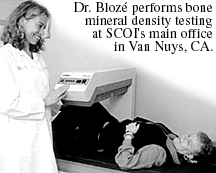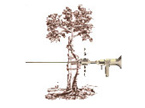There has been much recognition of osteoporosis as a women’s health problem, but five million American men are also affected. Even teenagers are not immune, particularly girls. Osteoporosis causes the bones to weaken and fracture under the slightest stress. If detected early, it can be prevented and treated before significant bone loss occurs. Bone tissue can be affected by age, heredity, unhealthy habits, diet, sex hormones, physical inactivity and certain medications.
Osteoporosis can be a complication of any chronic disease involving the lungs, liver, kidneys, GI tract, hormones, and rheumatoid arthritis. Bone loss can occur as a result of long term use of steroids, thyroid hormone, some anti-convulsant drugs and chemo-therapies.
Low levels of sex hormones are the major cause of osteoporosis. Men with low testosterone levels can be treated with replacement therapy.
Detecting Osteoporosis with Bone Mineral Density Testing

Women who complete menopause or suffer loss of menstrual periods should investigate the possibility of bone loss with a BMD test. The BMD test is quick, painless, similar to x-ray, and can predict fracture risk.
Unhealthy habits such as smoking and excessive alcohol intake are known risk factors. A regular regimen of improved physical activity, especially weight-bearing exercise or the use of resistance machines, can prevent or slow the loss of bone with aging.
It is important to tell your doctor if you detect any loss of height, have sudden back pain or suffer a fracture with little trauma. A medical workup would include a complete medical history, x-rays and blood and urine test. Your doctor can order a bone mineral density (BMD) test at SCOI to detect low bone density.
Men and women who have risk factors should take calcium and, in some instances, Vitamin D, as a preventative measure. Additional treatments for osteoporosis now include calcitonin, which comes in a nasal spray, and bisphosphonate alendronate (Fosamax). Estrogen is the first line of defense against osteoporosis and the decision whether or not to take estrogen should be carefully considered with your doctor, who can recommend a specific program of treatment.


